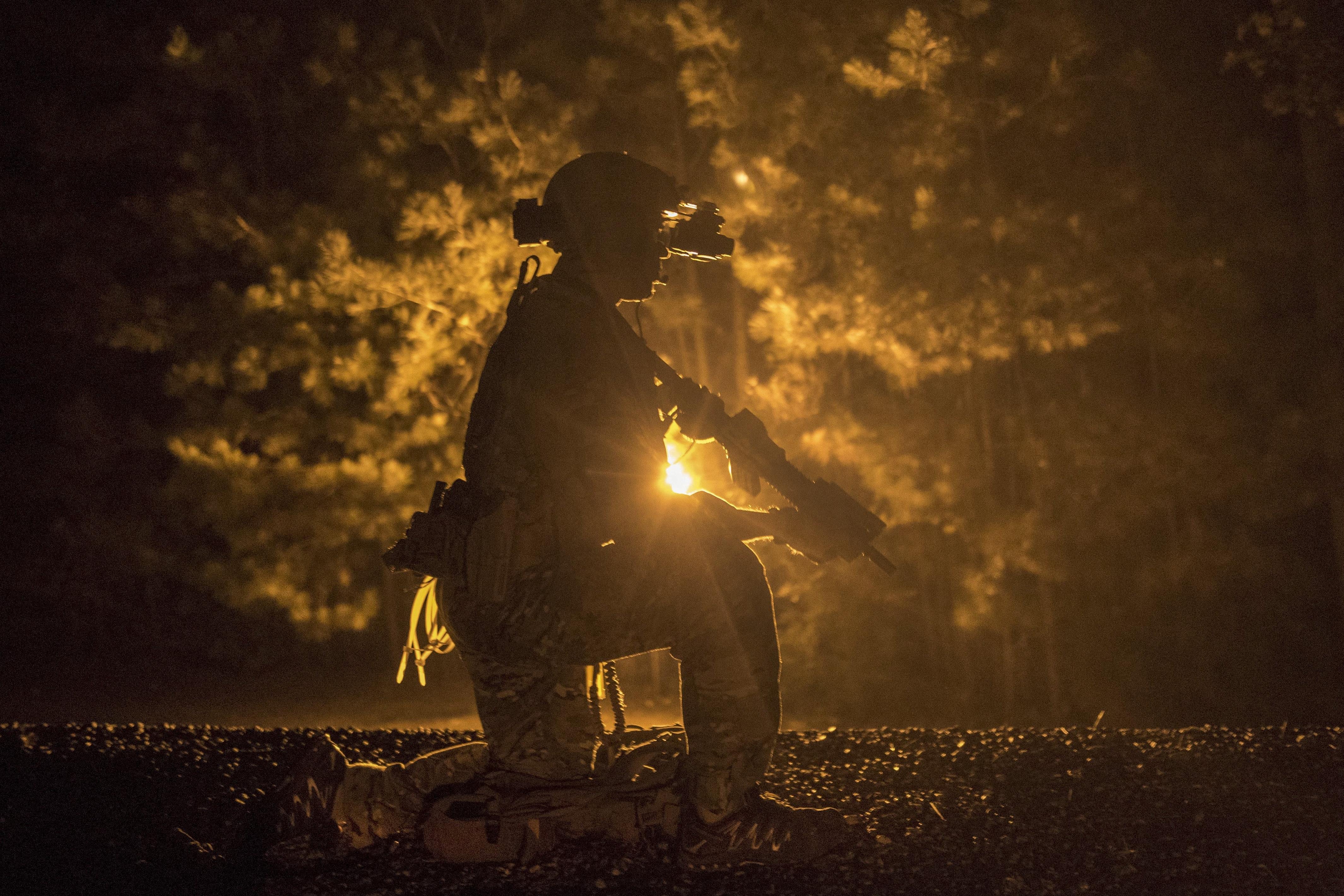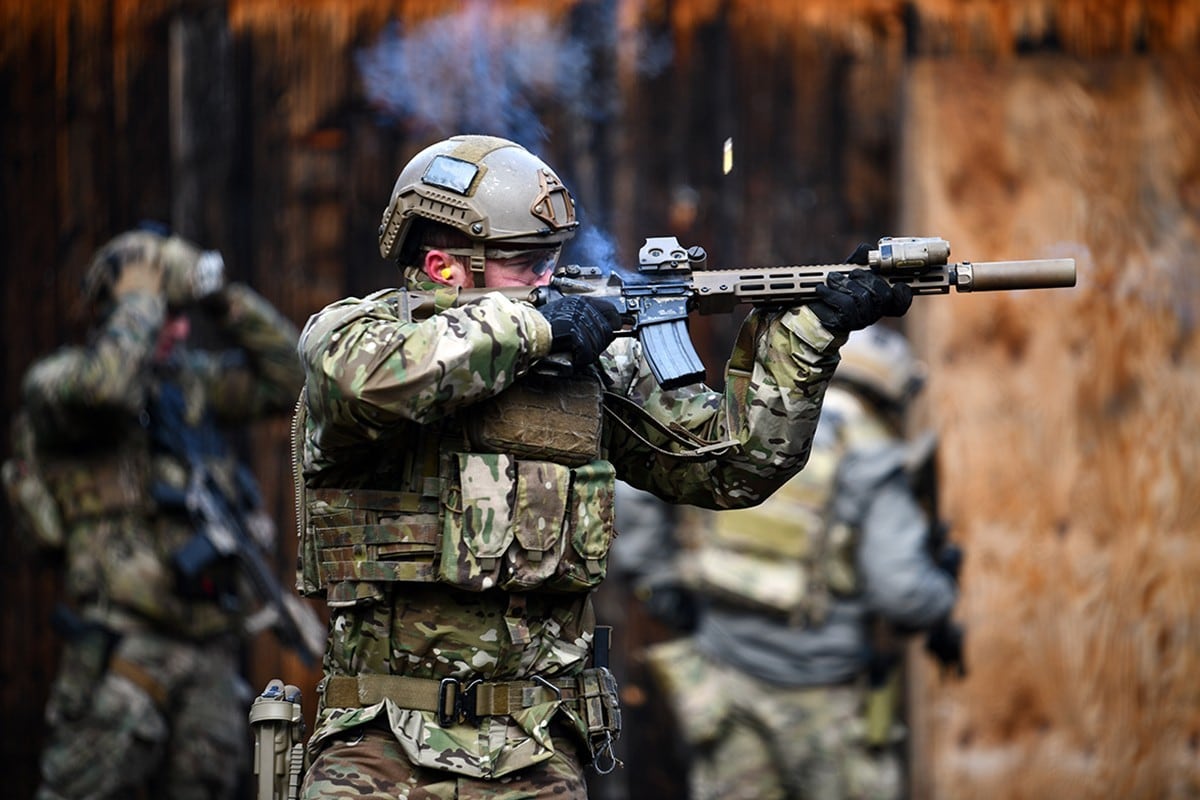The special operations forces community sees its contribution to the great power competition fight of tomorrow much differently than the past two decades of counterterrorism operations.
But leaders, commanders and thinkers in U.S. SOF who spoke at the annual National Defense Industrial Association Special Operations/Low Intensity Conflict conference on Friday see their piece of that work as already part of a “cognitive Cold War” already being waged.
Though to win that fight, the bearded, tattooed image of a SOF operator fast-roping onto a rooftop will have to be greatly expanded to include hackers, automated drone combat sidekicks and a host of cultural, language and thinking skills that the force desperately needs.
RELATED

Acting Assistant Defense Secretary for SOL/IC Ezra Cohen opened the conference made clear that with its shift to great power competition, the Pentagon cannot again shift to its excessive focus on deterrence and high-end conflict over the past 20 years and throw away irregular warfare lessons and practices.
That’s because many of those methods will remain relevant, although altered, in the new combat landscape.
“In short, we have ignored the asymmetric means that our adversaries have adopted,” Cohen said.
Cohen’s comments came in the backdrop of the Friday release of a classified summary of the Irregular Warfare Annex to the National Defense Strategy, which shifted planning to compete with China and Russia, primarily.
That annex was completed a year after the 2018 NDS.
Military Times sister publication Defense News reported that annex released Friday in an interview along with other reporters with Joe Francescon, deputy assistant defense secretary for special operations and combating terrorism.
“I think it’s important for the United States to characterize, both for us and for our allies, the military, national security impacts of what our adversaries are doing to us in the grey zone space before the armed conflict. It can’t just be an armed conflict solution is what we’re looking at,” Francescon said.
The main goal, he said, was to get members of Congress to understand the flexibility that the defense department needs to have to shift away from counterterrorism operations.
To meet those new challenges, current and former SOF leaders see a new set of skills and likely new sources of recruits for SOF members.
Retired Army Lt. Gen. Kenneth Tovo, former head of Army Special Operations Command, said the public image of the bearded, burly commando fast-roping onto a rooftop will be “even less representative” of SOF, especially in Gray Zone conflict.
Gray Zone conflict refers to hybrid warfare in which non-state or state-supported actors conduct operations that could range from militia-style attacks to cyber offensives that sit just below the threshold of major armed conflict.
Tovo said bringing in people with more diverse backgrounds, upbringings and experiences will give the SOF force a greater likelihood of being successful.
Some of that will come down to recruiting.
Command Sgt. Maj. Gregory Smith said that there is a bias built into the institution, but it’s not an intentional bias by individuals. It’s a process over time in which where the military looks to recruit and who it looks to recruit becomes more of the same.
“It is an institutional, over time, thing that has happened,” Smith said.
That will take a deeper dive into analyzing where the people needed to diversify the SOF forces are and how to reach them.
“We’re going to have to be a little more proactive than sticking a sign outside the PX saying ‘if you want to join, come to the meeting on Tuesday,’” Tovo said.
The SOF influencing role goes beyond recruiting. Where SOF has to operate is in shaping the battlespace, even if that’s virtual, long before the conflict.
And that involves information operations.
Retired Army Lt. Gen. Michael Nagata didn’t hold back when assessing U.S. information operations, “We’re being defeated in the information space.”
A big part of that is the norms and rules that the United States adheres to, having a democratic form of government.
“They can operate with abandon, they are not constrained by the truth,” Nagata said. “We can’t do that, we lose who we are by doing that.”
Some of that was covered in a general way by experts on panels at the SOL/IC conference, which covered AI and Information Operations in the SOF realm.
Michael Lumpkin said that the scale of countering a near-peer or peer competitor is much greater than the work that has been done in information operations in other conflicts.
Lumpkin is a 33-year veteran of Navy and special operations work, having retired in 2016 after serving as a Navy SEAL on task forces in multiple combat theaters.
Though there might be fewer “bearded, burly” operators on rooftops, they will still be there. And to meet the fight of the future, they’ll need futuristic tools.
A lot of that is going to come through software-enabled hardware that helps with the fight at all levels.
But for those in the tactical scenario, it means software that helps them make decisions more accurately and quickly than they can now.
Army Col. Joel Babbit, program executive officer for PEO SOF Warrior, said that AI will have to enable operators to move faster through tactical situations by seeing more.
One example he gave was house clearing, with the advent of suicide vests and house-borne Improvised Explosive Device tactics, the operator can no longer rush in, kicking down doors or even send in a dog first.
“We’re sending in drones first,” he said.
And those drones, flying or ground-based, must be able to navigate themselves. Operators can’t have their heads buried in screens and devices, they have to have heads up awareness, using the autonomous devices and software to widen their scope of the terrain.
“The drone acting as a tactical partner with the operator,” he said.
Todd South has written about crime, courts, government and the military for multiple publications since 2004 and was named a 2014 Pulitzer finalist for a co-written project on witness intimidation. Todd is a Marine veteran of the Iraq War.





